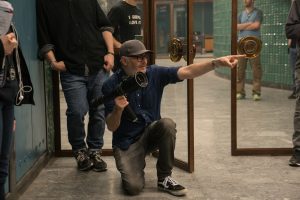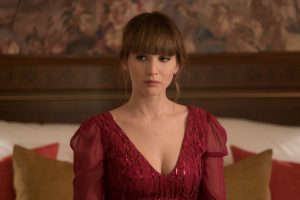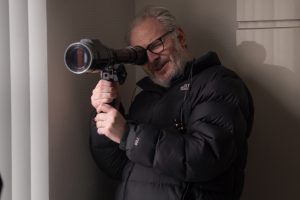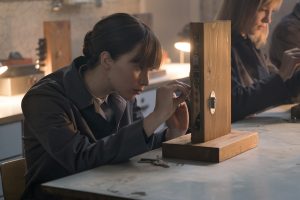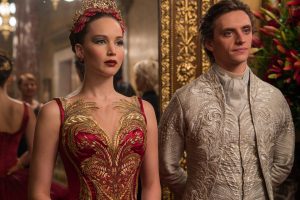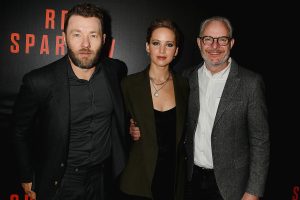March 2, 2018
by Carla Hay

Oscar-winning actress Jennifer Lawrence takes on the edgiest role of her career so far in the spy thriller “Red Sparrow,” in which she plays Russian former ballerina Dominika Egorova, who is forced to work for her government as a spy in order to stay alive and provide housing and medical care for her ailing mother, Nina Egorova (played by Joely Richardson). As part of her training Dominika is sent to a “Sparrow school,” which brutally teaches its students (who are called Sparrows) how to manipulate people through sex, lies and violence. During her work as a spy, Dominika meets CIA operative Nate Nash (played by Joel Edgerton), and their relationship turns romantic but keeps the audience guessing about where their loyalties really lie and if one person will betray the other.
“Red Sparrow” is based on former CIA operative Jason Matthews’ 2013 best-selling novel of the same name. The movie was directed by Francis Lawrence (no relation to Jennifer Lawrence), who previously worked with Jennifer on three of the four movies in “The Hunger Games” series. With plenty of violence that includes scenes of torture and sexual assault, “Red Sparrow” is geared to adults more than most mainstream spy films. Other members of the “Red Sparrow” cast include Matthias Schoenaerts, Jeremy Irons, Charlotte Rampling, Mary-Louise Parker and Ciarán Hinds Here is what Jennifer Lawrence, Edgerton and Francis Lawrence said when they gathered for a “Red Sparrow” press conference in New York City.
Jennifer and Francis, after working together on three “Hunger Games” films, you knew that you clicked beautifully. What was it about “Red Sparrow” that made you want to reunite?
Francis Lawrence: I was finishing “Mockingjay 2” when Fox sent me the [“Red Sparrow”] book, and I read it. I thought of Jen. Obviously, she’s a fantastic actress, so I knew she could really do an amazing job with the role. She’s also really fun to work with …
Jennifer Lawrence: I like this.
Francis Lawrence: So I thought that would be nice. And I also thought she could look Russian.
Jennifer Lawrence: I really like this!
Francis Lawrence: So when I finished reading the book, I called her up and I said, “Hey, hypothetically, I know you haven’t read it, but would you interested in playing a character like this?” And she said, ‘Yes.” And so we developed it with her in mind.
Jennifer, what was the key to discovering the Dominika character?
Jennifer Lawrence: There were so many things. I think the unique perspective on a life of a spy I’ve never seen a spay movie done this way, where it’s not glamourizing anything. It’s actually about the brutality of such a lifestyle, the anxiety, the lies, the deceit. And seeing this world of abuse, especially sexual abuse, through the lens of a woman who comes out and gets her power back by using her intellect—all of it was just very inspiring to me.
You trained in ballet in preparation for “Red Sparrow.” That was a whole new thing for you, right?
Jennifer Lawrence: That was the hardest thing I’ve ever done in my entire life … It was actually amazing. Halfway through I was like, “Oh my God!” Because my overall end goal is not to be a ballerina, so I was having trouble finding the wherewithal to keep going. But then halfway through training, I started feeling my muscles changing and my body language changing.
And also just understanding the mental and physical discipline and the mindset of a dancer, I realized that all of this work was actually character-building. It changed the way she moved, it changed the way she looked and walked. It was just another layer on Dominika. And then I finished and just threw my shoes and ripped the tutu off. Out! Done!
Joel, there is such an honesty and sense of honor to your Nate Nash character. Was that one of the keys to understanding this character?
Edgerton: Yeah. It seemed to me from meeting Jason [Matthews], who wrote the book and was himself an ex-CIA operative, I suspect that there’s a lot of operatives who go out into the field because they think they can make the world a better place. And having that optimistic view of the world also, ironically, makes Nate kind of bad at his job in the eyes of his superiors. “You should be more cynical. You should put every judgment through a more cynical filter.”
But I think Jason must think it’s one of those things about working for the government: You start with that feeling that the world should be a better place and you should make your mark on that. I just think Nate is truly a good guy. And on the flip side of the men in [Dominika’s] life is someone who also wants to be a crusader for a damaged woman, but she doesn’t necessarily need him to get her vengeance, which I think is cool.
Do you think Nate’s honesty puts him ahead of the game?
Edgerton: Ahead of the game and behind the game. It’s like if you’re going to the Olympics, and you’re not a drug cheat, you’re in one of the final eight lanes, but you’re probably not going to win at the end of the day. “Red Sparrow 2” is going to be all about Nate’s corruption. I’m joking.
In an era where there are drones flying around and there’s big-scale espionage, “Red Sparrow” really feels like spying is more person-to-person interaction.
Francis Lawrence: One of the things I loved about the book was that it felt really authentic. I think it’s the most genre-specific thing I’ve ever done. I’ve always been a bit wary of doing things that are really specific to a genre, because they’re typically well-worn. So you want to do something that you want to be unique. The authenticity of the world felt very unique to me. And the character journey felt unique. And the humanity of the characters involved felt unique to me.
Jennifer and Francis, since “Red Sparrow” is your fourth film together, did you find a new groove or try something different?
Jennifer Lawrence: The way we work was the same. Our friendship was the same. The subject matter was different. It was nice to start a new world and a new character. All of that was nice.
Francis Lawrence: The only thing I thought was different was because of the content of the movie, the conversations started much earlier than they normally would have between us. I think Jen was much more of a partner in the making of the movie much earlier than she had been on “The Hunger Games” films with me, in terms of script development and thinking about how specific content is going to play within a story. But the dynamic was the same. I think we worked differently and more thoroughly, I would say, than we had before.
Jennifer, is it true that Francis gave you little bits about the story here and there instead of telling you the full story before you agreed to do the movie?
Jennifer Lawrence: He planted seeds. He would talk to me about it a little bit. He’s known about my insecurities around sexuality and my fear of being judged. He knew about these fears that I had. But I think what he didn’t expect was for me to read the script and actually feel floored by it and feeling like it was incredibly empowering. I remember thinking that if I were to miss out on making something this absolutely fantastic and playing this amazing character because of these insecurities, I would lose. [She says to Francis Lawrence] I don’t know if that surprised you or not.
Francis Lawrence: I was not positive that you were going to do the movie.
Jennifer Lawrence: Yeah, me neither.
Francis Lawrence: That’s why I was doling out information carefully. I didn’t want you to pass on the movie even before we had a script. I think that I wanted you to either say yes or no to the thing I wanted to actually make, and not just random ideas from a conversation.
Dominika uses her body and her sexuality to achieve her goals, but in the end, it’s her mind and intelligence that prove to be the most useful. Was that part of the character process for you in watching that character’s journey?
Jennifer Lawrence: That’s one of the marks of an amazing spy movie—everything gets turned on its head. There are so many twists and turns in this movie. You never see where anything is going. You look at this movie from the outside and you see the Sparrow program, which is very inhumane and sexualized. These young men and women are being trained in the art of physical seduction, but in the end, she gets ahead by using her mind.
These Sparrow training schools really existed in Russia, right?
Jennifer Lawrence: Yeah. It was used by the KGB. It could still by the SVR. We have no way of knowing. America actually tried to use it in the ‘50s and ‘60s, but it didn’t work because of the cultural difference between Russia and America. They would try to blackmail somebody, like say, “We’ll send these photos to your wife,” and they’d be like [says in a defiant voice], “Do it.” In America, they’d be like “Damn.”
Joel, did Jason Matthews give you any clues on how a real CIA operative would act in these situations?
Edgerton: I learned a lot from Jason. And strangely, I almost learned a lot more from his wife, because she was an operative as well. Dating in the field is something that is a little dicey because there’s a third party involved. You go on a date, and you’ve got to report it to your bosses, and that person has to be vetted as well. I guess it helped the two of them that they were already both in the agency.
Francis’ point about the human nature of the story, rather than the constant gun-battle, car-flipping part of this world—and there is that element to this movie—but the human aspect to the character. I was very curious about the day-to-day life, the constant anxiety and the constant loneliness, particularly for characters like Nate.
It’s easy to forget when thinking about spies in the James Bond and “Mission: Impossible” context that they still bleed red blood, and they still have to cook breakfast. I love finding out those things about characters—it’s just constantly grounding them.
There’s a lot of graphic sexuality and violence in “Red Sparrow.” What was it like to film all of that?
Francis Lawrence: Once Jen signed on, we started a real series of conversations about the content and what the tone of that would be and the theme and character and the narrative. We had to be really, really careful that we did those scenes were done right. So those conversations started really early, partially so that we weren’t really going to tiptoe around any of that stuff.
It’s very easy for people to get shy about that kind of material. Had we not broken the ice early, the next thing you know, you’re coming up to that scene, and you don’t know how to talk about it, and you’re worried about it. You’ve just got to be as open as possible. So that’s where it all got started. Then when you have a scene with these two in an apartment, it’s very easy to have a conversation and it becomes work.
You also create a sense of privacy, so you only have the people who need to be there, and you tent off the monitors, and that footage only goes to me and the editor. It doesn’t even go to the studio. It doesn’t go to the producers. So they feel they protected in that way. For me, it’s about openness and honesty.
In terms of the violent stuff, I keep hearing about the skin-grafting scene. People keep talking about how intense that is. It’s so shocking to me, because on the day [of shooting that scene[,it actually feels kind of silly sometimes. Joel’s tied to this chair in his underwear writhing around, and there’s this guy with a little rubber prop moving it along his back …
Edgerton: Everyone’s game to make it look terrifying, but at the end of the day, it is a little silly.
Jennifer Lawrence: [She says jokingly] I don’t know if we’re selling the movie correctly. I think we should talk.
Francis Lawrence: I think what ended up really selling the scene was Joel’s reaction, his whole visceral body reaction. And the sound that the sound designers did, what they used for the skin-grafting tool was just fantastic.
Edgerton: First of all, hats off to Francis in the handling of those sexual scenes to make it about the brutality and not some kind of attempt to excite an audience. But it is interesting when you get to deal with actor on set. It’s amazing how actors when working on scenes, as much as you can tiptoe around actors, when director wants you to do something, when you’ve checked into a project, it’s amazing how game you are for anything.
It doesn’t mean you don’t have anxiety leading up to it, and you may wrestle with your own demons about it, but you’re game. It’s amazing what great actors are capable of doing. I’m always amazed at watching people from a distance the way they fearlessly handle stuff. This movie is one of those.
Jennifer Lawrence: Like Francis said, the reality is shooting is so much different from watching. It’s so much harder to watch. On the day [of shooting], everything so technical. It’s funny because I feel like Francis has known me since I was a child. He’s like a paternal figure to me. [She says to Francis Lawrence] I hope that doesn’t make you feel weird or uncomfortable.
And the camera guys I’ve known since I was little. It was almost like being in a nude house, you know like those families who get naked in front of each other. It felt like that.
Edgerton: I think it was weirder for them than it was for you.
Jennifer Lawrence: I think it was way weirder. I accidentally moved something and flashed the camera guys, and they were like [she says in a horrified voice], “Oh my God!”
And then here was that time I accidentally made a mistake [about] Francis’ intentions of coming into my dressing room. He was being very respectful throughout the underwear process of finding the right lingerie. When I would go into fittings, they wouldn’t take pictures. You never really go on camera without the director approving your lingerie.
And so they were like, “Jen, Francis is here to see you.” And I was like, “Okay, send him in.” And he walks in and was like, “Oh my God! What are you doing!” I was like, “I thought you came in to see the costume!” There was a lot of laughter throughout the whole thing … but watching them was more disturbing.
When you filmed “Red Sparrow” in 2017, you probably couldn’t imagine the state of affairs the world would be in a year later. Can you comment on that?
Francis Lawrence: It’s clear that the movie certainly reflects the world we live in today, but there were certain aspects of that didn’t feel all that relevant. We never set out to make a political movie by any means, but I remember having conversations with the studio in the development process, and somebody saying, “This modern Cold War thing doesn’t feel relevant; it doesn’t feel all that realistic.”
But again, it wasn’t all that of an important element to us and to the movie, and we kind of rolled on. And then we were in Budapest, we were in pre-production, the [2016 U.S. presidential] election was happening, and this stuff starts coming up in the news. And suddenly, the movie is becoming more and more topical—at least that element in the movie is becoming more and more topical.
Jennifer Lawrence: The relevancy really kind of landed in our laps, but so many of the themes in this movie have consistently been relevant—the abuse, the manipulation and the use of women and their bodies and harassment and unsafe workplaces. A lot of these themes have always been relevant. Nobody should put any sort of political weight in this movie. It is fiction.
Edgerton: Sometimes you make something and it grows and hits an intersection with something a little more resonant than you expect. I think on the one hand, it’s not about election meddling or that sort of collusion, but there’s definitely a deep curiosity that still exists—maybe it was dormant for a couple of decades—about Russia when you look at it from an American perspective.
“What do they want? What are they doing over there? What’s behind that curtain?”
Every time it comes up, we get curious about it. So yeah, it’s good for us in that regard. As far as the subject of women taking back power. Anything that supports that or reflects that in a story form is also awesome.
Can you talk about how “Red Sparrow” feels modern with classic elements of film? Was Alfred Hitchcock an influence?
Francis Lawrence: I would say not really any particular film, but Hitchcock was definitely an influence for me in this, even down to weird little things. The use of screen direction in the opening sequence.
I remember learning about in “Strangers on a Train,” there’s a great bit in the opening of the film where a car pulls up, right to left, and feet get out, moving right to left, and then car pulls up left to right. And you feel the collision course purely based on screen direction before these two men ever meet. And then they sit on the train, their feet touch, and the movie starts.
And so, I did the same thing with Nate and Dominika, where Dominika is always left to right, and Nate is always right to left. And you feel the collision course between the two of them is inevitable.
Jennifer Lawrence: I didn’t know you did that. That’s really cool.
Francis Lawrence: I did. It’s some of those things you don’t need to know.
Jennifer Lawrence: I don’t know why your movies are good. They’re just good.
Francis Lawrence: There was definitely a [Hitchcock] influence. When we were trying to find the sound for the music, I was using a lot of classical ballet as reference, and listening to a lot of Tchaikovsky and Stravinsky and things like that. And then James [Newton Howard, the composer of “Red Sparrow”] and I sort of stumbled on this weird mix of Russian-ballet-meets-Bernard-Hermann, and that’s what created that sound.



